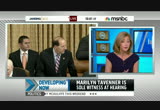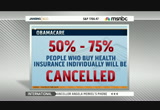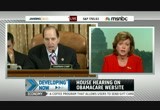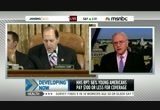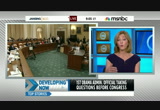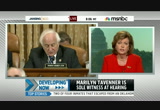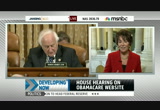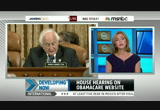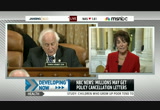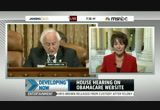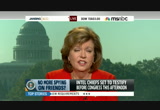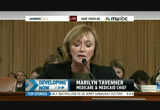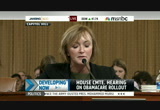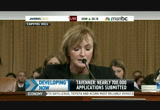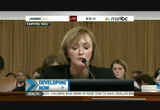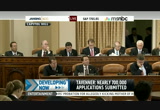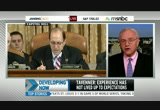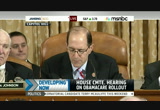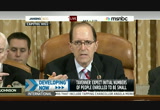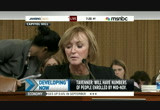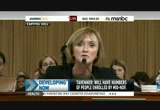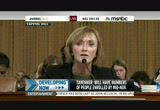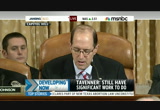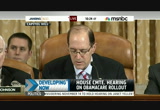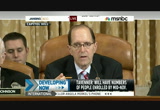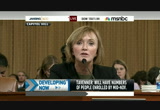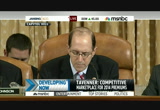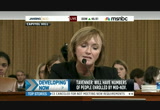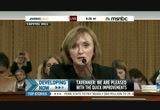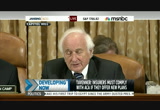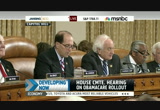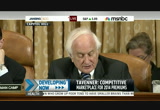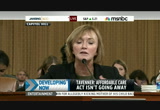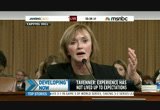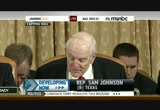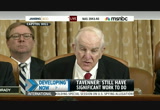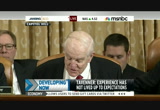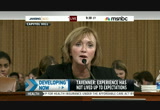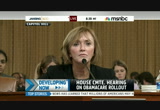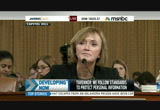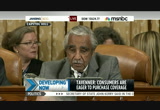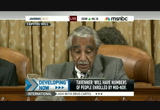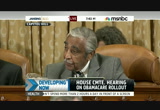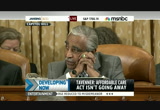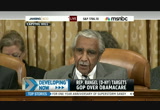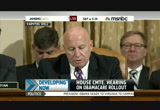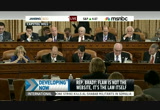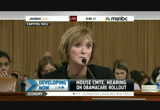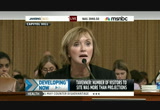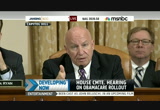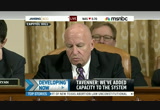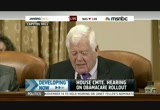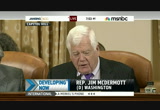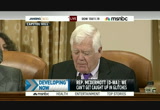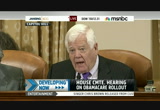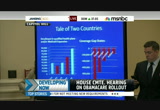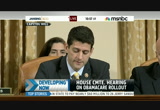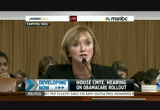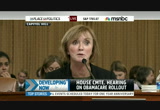tv Jansing and Co. MSNBC October 29, 2013 7:00am-8:01am PDT
7:00 am
good morning. i'm chris jansing. for the first time right now a key obama administration official, who's been in the middle of the botched health care rollout, is facing congress to explain what's going on with the obama care website. this is a live picture and you're looking at medicare chief marilyn tavenner. she had major responsibility for the health care overhaul and was just confirmed in may, though with strong bipartisan support in the senate. she also has a long-time friendship on the republican side with eric cantor. the head of the committee says he expects her to shed some light on systemic failures. did she see the problems coming? did she tell hhs secretary sebelius? i want to bring in our company. e.j. dionne, susan page is usa today's washington bureau chief. good morning. >> good morning. >> good morning. >> let's start with who she is. i think it's interesting. she was a nurse in the e.r., she worked her way up to ceo of a
7:01 am
couple of big hospitals. so she knows something about running complicated organizations. susan, what are you expecting to see this morning? >> i think she's going to get a more respectful hearing than kathleen sebelius is likely to get tomorrow, but this is a warm-up for tomorrow's hearing with secretary sebelius. you know marilyn tavenner has earned a good reputation in washington as a straightforward person and competent manager. on the other hand, it's her agency that's been in charge of this exchange website that has had so many problems so she is sure to be grilled about that. >> it was one of her people, though, who pushed through a change, e.j., that forced users to create these accounts before they shopped for insurance and that's what's been blamed on the massive bottleneck. is she going to have to take any kind of a bullet for sebelius? but there are also reports she was left out of key decisions. do you think she really is just a warm-up act for the hhs secretary? >> she's a professional. my hunch is she'll be very
7:02 am
straightforward. when you look in retrospect at that decision where you've got to create an account first, if you look at states where the exchanges seem to be working fine, where their websites are working fine, like kentucky, they let people shop first before they create the account. that looks like it was a better choice. and so i think she is going to be pressed on that. i suspect she'll be candid about it. i think that the obama administration's best path on this is to be -- is to be candid and say, you know, we made some mistakes here. we need to fix them. we're trying to fix them. but to say the underlying law can work. if you doubt that, look at all the states where it's actually working. >> there's another issue here, and that is who's going to be covered and who isn't. lisa myers reported for nbc last night that 50% to 75% of the 14 million consumers who buy their health insurance individually are going to get a cancellation letter because their policies don't meet the standards, the higher standards that are
7:03 am
mandated by the new health law. susan, considering president obama said over and over again if you like your plan, you can keep it, is this a problem? >> yeah, don't make a promise you can't keep. you know, this was the administration dealing with a pr problem they had at the moment, which was that people weren't comfortable, had a lot of questions about how the affordable care act would work. he told people they could keep their insurance plan. officials knew at the time that because they were setting higher standards for insurance policies, some of the current insurance policies would not be allowed to continue. and now they're having to deal with that reality. you know, he could have solved this problem back then by saying almost everybody will be able to keep the insurance policy they like or by saying most people will be able to keep them, but that's not what he said over and over again, so now they have to deal with the fact that they are being forced to explain why that doesn't apply to this segment of the market, and it comes at a time when there's just cascading criticism of other aspects of the affordable care act. this was a problem they did not need to have at this time. >> so the administration is
7:04 am
doing a number of things. one is they say, yes, some people will have to get other insurance, but it's going to be better insurance. they're also pushing that hhs report that shows how affordable coverage on the exchanges can be. i just want to show you a couple of stats. for adults 18 to 34, they say 46% could pay $50 or less. 66% could pay $100 or less. and the enrollment goal for that group of 18 to 34-year-olds is 2.7 million. so with even all the website problems, you do wonder, e.j., if that's not a little bit of an incentive if those numbers are indeed the case. >> no, i think that's right. i think it's quite clear, my colleague, a liberal blogger, who strongly supports obama care said, look, the administration should have been clearer. but the question is when you -- there are lies when you say black is white and there are
7:05 am
some that have a touch gray in them. so the administration should come out there. i think candor is their friend in all of this. say, yes, people in the private insurance market, and as lisa myers pointed out early this morning on chuck todd, we're talking about 14 million people. there's a lot of churn in that market with or without obama care. some people will have -- a lot of people may change their policies to something better. some of them are going to pay less, as those numbers showed. but i think they should try to move the debate as much as possible from getting hung up on very particular things that are being used to undercut the whole program and say, look, the question is will most americans be better off at the end of this? an i think they can win that debate. >> because in the meantime republicans have been having a field day and they just put out this morning a new set of ads about the website problems. one of them, the one i'm going to show you a little clip from, is going to air during "the daily show." >> hello, i'm the private sector. >> and i'm obama care. >> obama care, what are you
7:06 am
doing down there? >> i'm just down for a little maintenance. oh, wait, wait, i think i'm getting up, up, up. >> down again. >> susan, do you think more transparency can solve some of these problems for the administration? >> yeah, you know, e.j. and i have covered a lot of government crises in the past couple of years, couple of decades maybe, and there is a recipe for getting out of them and that is to say, hey, we made mistakes, we're going to fix them. we're sorry, we're going to make it work the way we promised you to do. people will forgive that. remember, we're just at the end of october. they opened on october 1st. there is still time to make the exchanges work, to have people understand better how this -- how the affordable care act is going to affect their own lives. but you need to start making a start in repairing some of the damage and some of the problems that you're facing. >> and as we wait for the comments from marilyn tavenner and we see the ranking member, carl levin there, let me bring
7:07 am
in anna eshoo. distinguish good to see you. >> thank you. >> is what we're seeing a preview of kathleen sebelius when she comes before your committee tomorrow? >> yes, i'm looking forward to it. it will be high profile. and of course my republican friends will -- it will be some high theater, but at the end of the day, i think that the things that i would like to know is -- and have confidence in is when the bugs are out, what's that time frame, making sure that healthy young people are able to enroll. this is all about getting people enrolled so that they can have health care, and it's a vote that i'm exceedingly proud to have cast, because it's such a great need in the country. so -- but i also think most
7:08 am
honestly that we have a real problem with federal procurement. it has been at the top of the list, one of the highest priorities of the government accounting office since 1992. and so i think that really congress, if we really want to do something across the government, that we examine that and that we update it because my sense is that smaller, more entrepreneurial companies that know a heck of a lot more than, i think, the contractors that were involved in this, for example, that we very well might have had a better outcome so i think that is it is tied to this. >> let me something if i can, congresswoman, and that is, and we were talking about this before we came on. millions of people could have their health insurance canceled or be forced to change it. that's according to this report by nbc's investigative unit, because their policies don't meet the standards of the new
7:09 am
health care law. what do you say to constituents who heard the president say if you like your plan, you can keep it. >> well, most frankly, there are some real junk insurance plans out there that people have been buying, pay for, but they don't have the coverage, the minimum standards that we now are going to have. so if -- if i have a plan that includes that, well, i shouldn't use myself as an example because as a federal employee, i'm part of the exchange. but if someone has a plan that has the coverage with those standards, they do get to keep it. if they have a junk plan, that's not going to -- that doesn't fit with the law. and what they will get, they will get much better coverage. and that's very important. so there's a difference between
7:10 am
the two. as one individual, i would rather have coverage with the benefits in it that really matter. >> but what we're hearing, congresswoman, is i'd rather have some coverage that i can afford than better coverage, arguably, that frankly is out of my price range. >> well, there's not going to be -- you know, these added benefits are not going to cost that much more, number one. number two, these benefits that are called for today, that fit with the law that passed, are really the essentials. and we knew that insurers could drop you if you were sick. we knew that insurers would not insure you if you had a pre-existing condition. we knew that insurers discriminated against women. and women are walking, talking, pre-existing conditions. so these are really very vital
7:11 am
benefits. and i think that when people get a close look at it, that they're going to be grateful for it. >> congressman anna eshoo, thanks so much for coming on the program. >> thank you. while we're waiting for the ways and means committee hearing to get to marilyn tavenner, the head of medicare and medicaid services, let me ask you both a little bit about what's going on with the nsa, spying on foreign leaders, president obama considering banning spying on our friends and allies. susan, the u.s. already has a no-spying agreement with britain, canada, australia, now zealand, known as five is. but now if the president says no more spying on allies, maybe the first question is who do we consider to be an ally? >> who do we consider to be an ally, and are there situations in which it is in our national security interest to do a little spying on our allies? it's not shocking, i think, to anybody, even the foreign leaders who are now raising protests, that the united states engages in surveillance, even
7:12 am
with government that say we consider our friends. there is a balance to be struck here. and the question, i think, is has that gotten out of balance because of these incredible new technological capabilities we have to listen to the german chancellor when she's on her personal cell phone. >> i'm going to interrupt you, susan. my apologies. but marilyn tavenner has begun her testimony. she is, again, head of the center for medicare an medicaid services. let's listen. >> and those who are not part of a group plan could go to get affordable coverage. we know that consumers are having difficulty enrolling via the marketplace website. it is important to note that the affordable care act, however, is more than just a website. it creates a new market which allows people to access quality, affordable health care. it allows them to have insurance options. it creates a pooling of consumers into statewide group plans that can spread the risk between sick people and healthy people, between young and old, and then bargains on their behalf to get them the best deal
7:13 am
on health insurance. by creating competition where there wasn't competition before, insurers are now eager for new business and have created new health care plans with more choices. the premiums for coverage were lower than expected and millions of americans will also qualify for tax credits to make the coverage even more affordable. we know that consumers are eager to purchase this coverage, and to the millions of americans who have attempted to use healthcare.gov to shop and enroll in insurance care coverage, i want to apologize to you that the website has not worked as well as it should. we know how desperately you need affordable coverage. i want to assure you that healthcare.gov can and will be fixed and we are working around the clock to deliver the shopping experience that you deserve. we are seeing improvements each week and by the end of november the experience on the site will be smooth for the vast majority of users. over the past month, millions of visited healthcare.gov to take a
7:14 am
look at new health care coverage under the affordable care act. in that time, nearly 700,000 applications for coverage have been submitted across the nation. more than half of those are in the federal marketplace alone. this tremendous interest confirms that american people are looking for quality affordable health care coverage. we know that the consumer experience has been frustrating for many americans. some have had trouble creating accounts and logging into the site, while others have received confusing error messages or had to wait for slow response times. this initial experience has not lived up to our expectations or the expectations of the american people and it is not acceptable. we are committed to improving the performance and have already made progress. in the first few days when the site went live, few customers could create an account. now over 90% can. we've updated the site several times, fixing bugs and improving the healthcare.gov experience and added more capacity in order to meet demand. we are pleased with these quick
7:15 am
improvements and parts of the system are already working well. for example, the data hub, the routing tool that provides an efficient and secure way to verify information submitted by consumers is sending determinations to the marketplace in less than 1.2 seconds. social security has reported 4.2 million transactions with the hub and the irs has responded to more than 1.3 million requests. even with the success, we know there's still significant work to do and we've called in a team of experts led by jeff zients to analyze the site, identify and prioritize fixes. we spent the last few weeks -- last week going over that. and while these problems will require a lot of hard work, the bottom line conclusion is this health care.gov site is fixable. to get the job done, we've identified a clear path forward. a lot of fixes will be undertaken one by one. to ensure the work is done as quickly and efficiently as possible we've enlisted qssi to
7:16 am
serve as general contractor with this project. they are familiar with the complexity of the system and the work they provided for healthcare.gov, the federal data hub, is working well and performing as it should. qssi has the skills and expertise to help us address these problem. they will work with leadership and contractors to prior ties the needed fixes and make sure they get done. we are committed to improving the consumer experience with healthcare.gov. i encourage people to continue to aploy by phone, by mail or finding local help in their community. the fact is the product of the affordable care act, a marketplace for quality affordable health insurance will work. the product is not going away, and the people are not going to continue to wait. we know the price is not changing. we know americans have time to apply and enroll in affordable coverage. thank you, chairman. >> well, thank you.
7:17 am
>> e.j., she said i want to a l appaologize that the web has no worked as well as it should. what are you expecting from these questions and what do you think she can do to help further the administration's cause? >> well, i think that what she needs to do is say here is why we think it's fixable by the end of november. i think the administration has set itself a very hard target in the public's mind here. they're saying just after thanksgiving, this is going to work for most people. now, they got a little wiggle room. what is the definition of most. but i think they're going to be judged by whether people can access this site and get insurance. and so i think she needs to take people through why they think these problems are not problems that are so fundamental this they have got to reconstruct the entire thing. i think she's going to be pressed hard on that, not only by republicans but by democrats who voted for this thing, because they don't want to be stuck out there next year in an
7:18 am
election year having to explain a website that still doesn't work. >> let's go back to the hearing. this is the chairman, the republican from michigan, checking her. >> i don't have that metric with me but i'll check on it. >> i believe those are numbers that cms has put out. the associated press reported in early september that there was a memo prepared for the assistant -- by the assistant secretary for planning and health. are you aware of that press story and that memo? i think it went through your office to secretary sebelius? >> it went through the enrollment numbers? >> yes. and it said that there were month-to-month predictions of enrollment numbers showing a path to the seven million that i mentioned. >> right. >> could you make that memo available to the committee? >> certainly. >> according to the press report, the memo estimated that 494,620 people would sign up for health insurance under the program by october 31st. we're obviously very near that
7:19 am
date. have you met that estimate? >> we will not have those numbers available until mid-november. >> so do you not know? do you not have any idea of how many people are enrolled or -- >> folks are still in the process of enrolling both in the state-based exchanges and in the federal exchange, and we will have those numbers available in mid-november. >> are you getting those numbers? >> am i getting those numbers? not yet. not from the state. >> you have no numbers on who's enrolled, so you have no idea? >> we will have those numbers available mid-november. >> so no one is forwarding even weekly updates on -- >> i think you've seen some of the press, and i think that was on the graph earlier about what states have listed. we will get those numbers in mid-november. >> but i understand you're not publicly releasing those numbers, but i'm asking do you have any idea of on a weekly basis how many people enrolled? how do you not know how many people have enrolled?
7:20 am
>> chairman kemp, we will have those numbers available in mid-term. >> but is your staff updating you on those? are you getting those on a periodic basis? i realize you're not prepared to give this to the committee, even though this is a government program and we're trying to do oversight here and we're trying to understand what the problems are. do you have some idea of what those problems might be in terms of the numbers? >> i'm not quite sure what you're asking me. >> well, you've said that 700,000 people have completed the application process, so clearly you're getting some information. do you have any idea of how many of those can move to the next step of enrolling, of looking at plans, how many are eligible? how many have decided to enroll? >> once individuals complete the application, then they go into the shopping experience where they can look at plans. we do get numbers on the number of applications and then we need to break those out. that's what i'm saying, this is part of the rollout that we will give in mid-november for the
7:21 am
october data. >> so you do have the applications, which is the 700,000 number. >> yes. >> but you don't have how many people successfully enrolled. >> i'm saying people are still in the process of enrolling. >> of those 700,000, do you know how many of those are eligible for medicaid at this point? >> we have some information on who is eligible for medicaid and then obviously states have their own information about that, and it depends on whether a state is expanded or not and what's going on inside. it's very state specific. >> can you share with the committee the information you have about those that have enrolled that are eligible for medicaid? >> we will also have that information available in mid-november as well. >> because that would mean of those 700,000, a significant portion could not be enrolli enrolling -- would not be in the exchange if they're qualifying for medicaid, isn't that correct? >> we will have that information available for you in mid-november. >> but the law is if they are eligible for medicaid, they are not enrolling in the exchange. that's my question. >> correct. >> so there could be a
7:22 am
significant portion of that 700,000 that would not be enrolling in an exchange, is that correct? >> there could be numbers in there that will be eligible for medicaid, that's correct. >> do you know how many of the 700,000 have qualified employer-sponsored insurance and, therefore, will not be eligible for the exchange? >> those individuals who have employer-sponsored insurance usually at the end of the application, they're asked that and if that's the case, they usually don't proceed. >> do you know how many of those 700,000 are young adults, say under the age of 26 who might choose to stay on their parents' plan if it's cheaper? >> i do not. >> and do you know how many are undocumented aliens and who may not be eligible to enroll in the exchange? >> as you're aware, we actually have a connection through the data hub to check for that. if they are not eligible, they do not complete the application and do not go on to shop. >> but of these 700,000, do you
7:23 am
have any idea how many are just looking and how many are trying to enroll? >> we actually look at the people who are shopping and obviously the majority of the people who are completing applications are there to actually purchase insurance and so they continue to go through the shopping experience. >> well, there are media reports that say as many as 80% of that 700,000 number are actually eligible for medicaid. is that a number you'd dispute. >> i don't know where that media report is or how they would get that information. >> if that's true, that's the only information we're getting frankly today. i frankly would have hoped for a little bit more from you. but if that's true, then less than 140,000 of these applicants are potentially enrollees in the exchange and that's assuming they don't have employer-provided coverage, that's assuming they can't stay on their parents' plan or otherwise ineligible in some other way. that means you're likely to hit
7:24 am
less than one-quarter of this october estimate of 494,620. how many people did you estimate would enroll between november 15th and december 15th, which we're two weeks off from that period? >> i don't have that in front of me. i'll be happy to get you that information. >> if you could get that to the committee, i'd certainly appreciate that. but given that the back-end systems aren't working and insurers have resorted to manually enrolling people one by o one, i just think the system doesn't literally have the human resource capacity to manually enroll the numbers that are being projected here. i assume that many people are holding off, are the young and healthy. so the risk pools in these exchanges are not going to align with the projections. so i think not only are we going to miss the seven million enrollee targeted, it appears we're going to miss the demographic makeup as well and
7:25 am
that's going to be very important to have a functioning system. if the demographics are wrong and there aren't as many young people enrolling, what happens then? what happens to premiums? >> i think the premiums are locked down for 2014, so obviously the next six months of enrollment are critical. i'll remind you that enrollment does occur until march 31st of 2014. i'll also remind you that the massachusetts experience was very slow initially and then it started to ramp up over time. we expect the same time of projections. >> but it doesn't look like you're even meeting your own projections that you had prepared. >> i have not listed any information on enrollment. i think there are some assumptions you're making. >> well, i'm just referring to this associated press memo that i appreciate you're willing to give to the committee that said that half a million people would sign up by october 31st and that they would enroll. but if we don't meet this
7:26 am
demographic of 2.3 million young people, i mean it's very clear that premiums will go through the roof, whether in the next few months or in the future. and if that's where we're headed, and it appears that we are, how will you provide relief to individual americans who don't want or can't afford this insurance and how do we prevent the premium spike in 2015 as insurers will readjustment their prices to reflect the actual enrollee demographic? >> currently if you look at the premiums for 2014, we did not see premium spikes. we actually saw a very competitive marketplace. in fact we have over 200 issuers just in the federal exchange alone who have offered more than 3,000 plans at very competitive prices. so markets have as many as 54 plans in a market. we've also seen 25% new issuers
7:27 am
in markets. so far what we've seen is the absolute opposite of what you're suggesting. >> have you enrolled in the plan? >> i have employer-sponsored insurance. i would not be eligible for the plan. >> from the federal government, is what that you mean? >> yes. >> so you're not participating in obama care? >> i'm participating in employer-sponsored insurance, which 85% of the country does. >> so you have government insurance so you're not -- have you gone on the site and tried to enroll or tried to shop for plans? >> i haven't gone on to shop for the plans. i went on and actually signed up for an account just to see what it looked like and go through the application process but did not sign up for coverage. i'm not eligible for coverage nor did i shop. >> i just want to mention to you a letter that i received from my district and this man wrote me and said my wife has been recently informed by her insurance carrier that her
7:28 am
health care policy does not comply with the affordable care act. now we must purchase a new policy to get the same coverage at an 18% increase in our premium. so what happened to the if you like your insurance you can keep it question? what would you say to that individual? >> well, i would take them back to preaffordable care act days where in fact if you were in the individual market, you were living at a 50% turn. half the people in the individual market prior to 2010 didn't stay on their policies. they were either kicked off for pre-existing condition, they saw their premiums go up at least 20% a year, and there were no protection for them and sometimes they were in plans that they thought were fine until they actually needed hospitalization and then they found out it didn't cover hospitalization or it didn't cover cancer. so i would take them back to the fact that since 1986, health care costs and coverage have been the number one issue for small businesses for the last 20 to 30 years, and we've been talking about it for the last 20 or 30 years.
7:29 am
that's actually why i came into this job is to try to deal with this issue. so now what i would say is this. now if in fact the issuer has decided to change the plan, didn't have to, plans were grandfathered in in 2010, if they didn't make significant changes in cost sharing and this sort of thing, they could keep the plans that they had. but some insurance companies have decided, and i think that's what you were referring to in your opening statement, that they want to offer new plans. if they offer new plans, they have to come into the requirements of the affordable care act which are you have to offer the ten essential coverage benefits, you cannot judge people on pre-existing, you cannot discriminate based on sex. there are lots of things that are required under the affordable care act that actually protect consumers. but these premium increases were going on a long time prior to the affordable care act. in fact we've seen the most premium moderation in the last three years than we've seen probably in 15 or 20 years. so that's what i would say to them.
7:30 am
i'd try to explain to them the real issues. >> well, the carrier told them that the plan didn't comply, but nothing you said had anything to do with how they can get their costs down, and i think that's the real problem that we're seeing here is that the costs are -- >> so what i would tell that individual is if their carrier is telling them they're changing the plan and offering an increase, that they would need to go take a look at what's available in their state and in their market, which is certainly something that's available to them through the exchange. >> at an 18% increase. all right. with that i'll recognize mr. levin. >> thank you. a warm welcome. the chairman talked about the website and you said it's going to be fixed. and i might say if everybody would pitch in to make it work, the goals that have been set
7:31 am
would be more readily met. that's what happened with prescription drug program. we all pitched in to make it work. and it had major problems at the beginning. and instead of standing in the way, we said we didn't vote for it, let's make it work, and it began to work. if we all had the same spirit about aca, it would be more than helpful. but then the chairman asked you about the notices that are coming from the insurance companies, and i'd like to ask you about that. a gentleman from michigan who had an $800 blue cross plan got this notice from michigan blue cross. went into the website with the help of navigators and ended up with a blue cross silver hmo
7:32 am
plan with tax credits in that case instead of $800 a month, it's $77 a month. let me refer you to the interview on "meet the press" with the blue cross florida ceo. he was asked by david gregory in florida, the oldest and largest health care plan provider, florida blue cross, confirmed it is cutting 300,000 policies. and this is what the chairman of blue cross of florida said. we're not cutting people, and i quote. we're actually transitioning people. what we've been doing is informing folks that their plan doesn't meet the test of the essential health benefits. therefore, they have a choice of many options that we make available through the exchange, and in fact with subsidy many people will be getting better plans at a lesser cost.
7:33 am
so this has become a matter of legitimate discussion and i think all of us would appreciate your addressing it. >> sir, again, going back to prior to the affordable care act days, these individuals in a small group or individual market had no protections. they had no guarantees of coverage and they were still being charged somewhere between 20% or more premium increases year over year. so they could be kicked out at any time for pre-existing condition. sometimes they thought they had coverage when they did not. and when they went in and had a cancer dgsiagnosis or cardiac diagnosis they found out maybe they had a $500,000 hospital limit or certain disclaimers. then there was always if you were diagnosed with asthma or high blood pressure or some other chronic disease, you might not be able to get coverage at
7:34 am
all. so that's what's different. that's the first part. the second part is in 2010 we told issuers to try to give some transition time, if they wanted to keep policies as they were currently defined, whether they were in a group market or individual market, they could. and so some of them elected to do that. now some of them are moving to the new standards, and the standards under the affordable care act are pretty simple. you have to have the 80% mlr so you can't be taking money more than the 20% to marketing, advertising profit. you had to beat the ten essential health benefits. you had to define co-pay, deductible and diseases in clear and understandable terms so people would know what they were buying. you had to have choices among plans. and then there are folks in the individual market who when they go on the site may qualify for tax credits. some in some states may actually qualify for medicaid expansion. but this is not -- this problem existed long before the affordable care act.
7:35 am
now folks are transitioning to the new standards of the affordable care act which guarantee you can't be denied. you won't be kicked off of a policy because you develop a problem. you may be eligible for tax credits, depending on your income, so these are important protection that are now available through the affordable care act. i think that's important. >> thank you. i yield back. >> mr. johnson is recognized. >> thank you, mr. chairman. miss tavenner, thank you for being here. you know, i've been hearing from folks back home who rightfully so are very serious about their concerns and fears about their health care. steven, from plano, tried to purchase insurance through the exchange but ended up more confused and frustrated. operators on the 1-800 line didn't have answers to his specific questions. they simply reiterated that anyone could sign up for the exchange, but he should wait
7:36 am
until later that evening or the next day to apply since the systems were having technical difficulty. worse, a single father and police officer in plano went to renew his 11-year-old daughter's plan. she has no medical problems, yet her premiums doubled. doubled. those are the real stories of fathers, mothers, sons and daughters who have to live with the law that up to now has complete low failed them. miss tavenner the administration delayed the employer mandate for one year. the treasury witness before the committee testified the reason the administration granted big business a one-year delay is, quote, employers and their representatives have requested transition relief for 2014 because of the concerns about the difficulty or costs of complying with the employer mandate.
7:37 am
secretary sebelius appeared before this committee and repeatedly said obama care was ready. it clearly wasn't. doesn't the failed launch indicate many individuals are going to have at least as much difficulty complying with the individual mandate as big business had with the employer mandate, yet from the announcement last night, you've only given individuals a six-week delay. cms announced 700,000 people had submitted applications for exchange coverage nationwide, but with all the challenges you have been facing, there are some serious questions about what these applicants know. cbs news reported, quote, the shop and browse feature is not giving consumers the real picture. in some cases, people could end up paying double what they see on the website. so how many applicants applied based on the wrong premium
7:38 am
information? do you know? >> the completed applications were done -- the 700,000, these were individuals who completed applications and figured out if they were eligible for tax credit. i do not know where cbs news is getting their information about erroneous tax credits, so i can't address that. i will say that in the individual mandate issue, that folks can apply through march 31st. we have said public low that we will have the website in good working order by the end of november. we predicted folks will increase their interest in december and again in march so we believe we are in good shape to handle that. >> well, if you've identified the problem and are taking steps to identify who received faulty price information, apologize and
7:39 am
provide the right information, are you doing that now? >> yes, sir. if we've given people the wrong information, we will certainly correct it, but i'm not sure what cbs news is referring to. >> i'd like to bring to your attention a story which ran last week in mother jones with the headline, quote, how healthcare.gov could be hacked. let me just quote from the article. security experts say the federal health insurance website is vulnerable to a common technique that hackers use to steal personal information. as you may know, i'm chairman of social security subcommittee and one of my longest outstanding priorities has been to protect americans' social security numbers. so for the record, is obama care website 100% safe from hackers who could steal americans' personal information, including their social security numbers? yes or no? >> we follow all the standards to protect information, including social security numbers. >> are you trying to say yes?
7:40 am
>> am i trying to say yes, that we follow the standards to protect information? yes, sir. >> you know, folks are confused and scared. they have heard horror stories and are now experiencing them firsthand. how can they trust the federal government to not only fix the website, but more importantly give them the assurance that their personal information will be safe and their health care will be affordable? that if they want to keep their current plan, they can do so. the problems don't stop at the technical failures of a website. the real problem stems from the colossal failure to deliver what this law promised the american people. thank you, mr. chairman. >> all right, thank you. mr. rangel is recognized. >> thank you so much, mr. chairman. welcome to our distinguished committee. you may wonder why the administration appears to be under such severe attack by some members of this committee,
7:41 am
especially as it relates to our goal to provide health care for 30 million americans that can't afford or don't have access to it. but it should give you some small comfort to know that historically the republican party always fought vigorously against these type of programs. i don't think that one republican voted for the social security act, even though those old enough enjoy the benefits. >> that's not accurate. >> that's not accurate. >> well, we'll see. maybe one or two, i don't know. >> no. >> but they opposed medicare. i spoke with president johnson and he shared with me at the ranch the people that had signed off on medicare. and anyway, it's big government, even if it saves lives. who cares. you're against big government. so why should obama be spared
7:42 am
the attack because he wants americans to be healthy and strong and productive. we have to be consistent, and you guys and ladies have been. what i don't understand is that people aren't born as republican and democrats, and there has to be somebody, regardless of party label, that has suffered the embarrassment and the pain of being denied an insurance policy because they have been sick before. the people who actually need health care the most are too high a risk for some of the insurance companies, and this body, republican and democrats, allow things like this to happen. when i was a kid if my mother took three of us, three children to see a doctor and we weren't sick, they would think she's crazy because you couldn't afford a doctor. now health care will provide you getting the type of treatment to
7:43 am
avoid you being sick and having to lose your dignity and in personal emergency rooms that provide the most expensive health care that we have. but republicans who have always been admired for being fiscal conservatives have certainly seen the price of health care, the lack of quality that we may have today, soar to become such a part of our national budget that in my opinion it's a threat to our national security because as prone as some of you are to enter into conflict with other countries, you need healthy young people to fight these wars, and health care is important from birth throughout one's life. so i don't know how you're going to explain when this program, which is destined to succeed, how politically you're going to
7:44 am
explain your positions today. and since your entire political program is locked into hatred for the president and this program, it seems to me that we have to find other ways for us to politically combat each other, because i hate to see the day that there's no republican party and i have to rely just on my party for justice and fair play. and so we have to come together some kind of way to see what's best for america. now, you may not like this program and it certainly has been disappointing as a start, but what i want to see more from this committee is how can we improve and get quality health care for all americans. this has to be a part of the goal that all of you have. and you also have to recognize that when we're lucky enough to have public servants to work for
7:45 am
the administration, whether democrat or republican, that they are servants the same way we are and they deserve some dignity as well. and so for america, i hope and have every reason to believe, like social security, like medicare, that the goodness of the program will prevail and if there's anything that we can do to help you, and there may be some republicans that will join with me, to make certain that we get rid of what is not working and make certain everyone has access to health care. i wish i could see the politics involved in this, because i am a partisan. but a stronger america means a stronger party, and that's what we are all here for. i just want to thank you for your dedication and for you to recognize that it's all political and we have to do our job and get on with it. thank you for your service.
7:46 am
>> thank you. mr. brady is recognized. >> just a quick fact check on the blast from the past. republicans did support social security and medicare and more recently republicans were the ones that reformed medicare to add that important prescription drug benefit so we could have seniors lead healthier lives, stay out of hospitals and enjoy their grandchildren more. what's become abundantly clear, the flaw is not the website, the flaw is the law itself. this is what happens. we inject 159 new federal agencies, bureaucracies and commissions between you and your health care. this was supposed to be the easy part. just wait until you see the government making decisions about patient care, about reimbursements and treatments for -- that you receive from your local doctor and hospital. miss tavenner, i have a great deal of respect for you and i suspect many republicans do. yet the white house, secretary sebelius, you and your staff
7:47 am
made repeated claims to the american public and to congress that everything would be ready on time. everything was a go. none of that proved to be true. now we're told everything will be okay very soon. so why should the american people believe you now? >> congressman brady, i would go back to what has worked in the last three and a half years since the affordable care act was implemented. we have been able to make a difference in the lives of coverage of young people. we've been able -- >> but specifically on the website and the exchanges. why should the american people believe you now? you've had nearly four years to get it ready. now you're saying in four weeks more it will be great. so what's different? why should anyone believe these claims? >> because i think we've identified two major problems. one had to do with the initial
7:48 am
volume. and despite our best volume projections, we underestimated the volume, the interest in the site. >> you noted the volume isn't the same as the applicants and the enrollment. that you yourself visited the site. clearly you weren't shopping for it, others did as well. so to the chairman's point, the number of applicants, the number of enrollees still not known is pretty modest, wouldn't you agree? >> but i would tell you that the number of visitors to the site and the number of people interested in completing applications was larger than even our initial projections. we worked our projections off of the seven million number that chairman camp mentioned. we also worked it off our history with medicare part d. so we've added capacity to the system and we've improved system performance. that's the first thing. the second thing is that we have found some what i will call functional -- or glitches, as we call them, in the public term,
7:49 am
in the actual application itself don't we' which we're repairing and that is the gradual improvements that you'll see the in the next four weeks. >> my constituents are frightened. like millions of americans they are now being forced out of the health care plan that they like. the clock is ticking on a website that's broken. their health care isn't a glitch, it's what they depend upon. so, you know, you've been described as a quarterback of the obama care rollout. i'm sure that's not the term you chose for yourself. but can you guarantee no american will experience a gap in their health care? >> so what i can guarantee is that we have a system that's working. we're going to improve the speed of that system -- >> excuse me. >> yes? >> you're saying the system right now is working? >> i'm saying it's working, it's just not working at the speed that we want and at the success rate that we want. those are the things we're
7:50 am
working on. we also have alternative methods for folks. they can use the call center, they can use paper applications. then we have in-person assistance available in each state. so i can guarantee you that we can reach out to each individual and help them select a plan and enroll. so yes, sir. >> but to my point, this is not supposed to be fixed until november 1st. people have just two weeks to apply, enroll, be confirmed. so what happens on january 1st when they have an illness, they need patient care then, they have not heard back from the government. what do they do then? >> they actually have until march 31st to enroll. >> no, but their plan has been cancelled, as millions of americans have found out. it ends december 31st. and again, what my constituents want to know, what happened? >> the individuals who have received notices from their issuers is a different
7:51 am
situation. they can certainly, obviously, sign up, transfer, as we talked about earlier with blue cross of florida, or they can go on the exchange or call the call center. >> but my point is, it's been cancelled. they don't have health care. they tried to get on the website unsuccessfully. they don't know if they're enrolled. it's january 1st. they're facing a gap in coverage. what do you tell them? >> and i'm telling you they can call the call center today and we will help them. they can go online, if they're not successful, we can help them through the call center. we also have people in their individual markets that can help them in person so there are more methods than just the website, and i think that's important. >> i think what's become clear as well is obama care is not ready. the question is why don't we make it voluntary? why don't we give americans a choice so they're not forced into this health care that they don't want. chairman, yield back. >> mr. mcdermott is recognized.
7:52 am
>> thank you, mr. chairman. mr. rangel has asked me to correct something. the vote coming out of the committee was on a party line vote. there were no republicans who voted for it when it left this committee. or there were 81 who finally voted for it, mostly progressives, but there's none left in the congress. >> yes, 84% of republicans voted for the social security act 77 years ago. i'm glad we're debating current events. >> reclaiming my time, mr. chairman. with the way my republican colleagues have been fretting over the success of the affordable care act exchanges, you'd never know they spent $24 billion shutting down the country to get rid of it. suddenly they seem desperate to see a bill that they didn't want actually work. it's like the annie hall joke. the exchanges are terrible, and not enough people can enroll. now, this is one of the biggest reforms our country has ever made and we are only four weeks
7:53 am
into medicare -- or into it. medicare wasn't built in a day. part d didn't roll out with snags along the way. as others have mentioned, many of the republicans who are now calling for blood over this rollout were begging for patience on part d. the kinks of that rollout were easily brushed off by many gop alarmists who sit on this dais. we waited six months to hold an oversight hearing on part d. we're barely four weeks into this one and we're already declaring it dead. it is premature death. we would have all loved to see this launch be seamless and smooth, but we can't get caught up in the glitches and the technical difficulties and lose our perspective. help lines are up and running. i want to put the first chart up, because i think that you need to know that it's working in some states in this country.
7:54 am
we've had a health plan finder in the state of washington that's been out on the street before october 1. in washington state we were ready to go and we have got 92,000 people who have now enrolled. now, there's a difference between enrolling and being approved, having your plan approved, because you have to make your first payment. so when you talk about enrollment, you may be talking about something different, you're not comparing apples and oranges. but there are states in which it's working. people can sign up by mail, in person. we had actually a mobile sign-up van that's going around the state, stopping in small towns and giving people a chance to talk to somebody. 49,000 people are already in the program. not just finished the application. now, there have been some glitches, even in our state.
7:55 am
but we got around them. our country does have a serious problem, however, with access to quality health insurance and it's not being caused by websites. all of the computer programmers in the world aren't going to be able to help the 180,000 hoosiers who fall into the affordable coverage gap because indiana isn't expanding its medicaid. of course that's nothing compared to georgia's 400,000 people who aren't going to get anything or florida's 760,000, and then of course there's texas. texas is always the best. and they're not going to be outdone. texas boasts 1,046,430 people who will simply get nothing. no medicaid and, i guess they can come to the government exchange, which people here want to kill. that's over a million texans, working poor with minimum wage
7:56 am
jobs, multiple of them, and they are just trying to get by. now, they could be covered at no cost to themselves or the state of texas. but instead the gop wants to see this president fail because they'd rather let their constituents go uninsured than compromise. those texans and floridians and hoosiers are simply out of luck. meanwhile, in other red states, like kentucky, they have enrolled already. 26,000 people through the state exchange or expanded medicaid. arkansas, now they don't want it either and they don't want to accept the medicaid money. they constructed their own way in cooperation with the federal government and they have got 56,000 people enrolled in arkansas. now here's a red state that worked very hard to partner with the federal government and arrive at a solution that's working for its residents.
7:57 am
it's time really to start working together. 44 attempts to repeal this law. it's now law, folks. it's now up and running. it's going to run and it's time to stop this kind of sniping and get together and figure out how to make it work. no one on our side thinks the law is perfect. >> thank you. time's expired. mr. ryan is recognized. >> thank you. thanks for being here. i think what we're seeing here are all these rude awakenings that the american people are waking up to find. promises made and promises broken. we had a hearing here in this room on august the 1st with the irs. the irs confirmed that the delay in the employer reporting requirements would mean that the irs would not have the data on the back end from employers until 2016 to verify if an individual had been given an offer of affordable employer-sponsored health insurance in 2014. now, the reason this matters is that determines whether a person is eligible for a taxpayer funded subsidy or not.
7:58 am
to mitigate this, dan wurffel told us, quote, we're going to help the individual at the front end when they're navigating through the exchange to understand whether they have an employer plan. let me ask you this. of the 700,000 applicants you've received, how many of them did you verify whether or not they have been offered or have -- been offered employer-sponsored insurance? >> the verification of employer-sponsored insurance is part of the application process. so if in fact that was available to them, they would not go on and complete the application. >> so it's just a self attestati attestation, is that what you're saying? >> we ask some additional questions. if you go online, it requests additional information and we have ways of verifying whether or not employer-sponsored coverage was offered. so it's not just as simple as yes or no. if they don't have it, it's a no, and so we accept that.
7:59 am
if it's a yes, then we try to work with them to see if they're eligible for anything or not. >> okay. so i look at yesterday. you released a report that talked about premiums for young adults. the report admits, quote, these estimates do not take into account the tax credit eligibility requirements. young adults on their parents plans. let me ask you this. are you proactively finding out if individuals under the age of 26 are eligible -- who are eligible to stay on their parents plan are doing that or not, because they're not eligible for a subsidy then as well. >> what we've seen is since the affordable care act, we have over three million young adults who are getting coverage through their parents plans which is pretty much the pool we anticipated, so they are going through their parents plans. >> when they go on the website, are you verifying whether or not their parents have a plan that
8:00 am
they're eligible for before determining whether they themselves get a subsidy? >> it is part of the application process. i can get you more information on that. >> well, here's the point. look, two weeks ago in the cr we passed a law that president obama signed. quote, prior to making such credits and deductions available, the secretary shall certify that the exchanges verify such eligibility consistent with the requirements of the act. here's the question. are we really verifying at the front end whether a person is actually eligible for these subsidies or not? and here's why this matters. if they're not eligible for the subsidy and then once we reconcile these records, they get taxed the money back off of their refund. and so this is what i mean when i say rude awakenings. people are signing up for insurance. they're getting tax credit subsidies funded by taxpayers. the irs is already telling us they're confused about how to do this. you're not telling us whether or not you're
100 Views
IN COLLECTIONS
MSNBC West Television Archive
Television Archive  Television Archive News Search Service
Television Archive News Search Service 
Uploaded by TV Archive on

 Live Music Archive
Live Music Archive Librivox Free Audio
Librivox Free Audio Metropolitan Museum
Metropolitan Museum Cleveland Museum of Art
Cleveland Museum of Art Internet Arcade
Internet Arcade Console Living Room
Console Living Room Books to Borrow
Books to Borrow Open Library
Open Library TV News
TV News Understanding 9/11
Understanding 9/11

